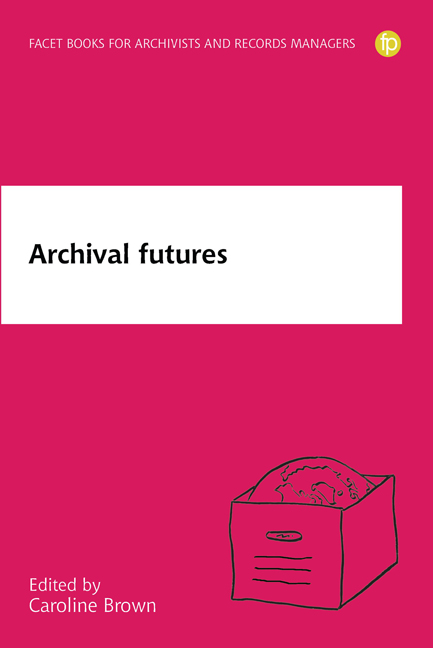Book contents
- Frontmatter
- Dedication
- Contents
- Notes on contributors
- Introduction
- 1 It's the end of the archival profession as we know it, and I feel fine
- 2 Whose truth? Records and archives as evidence in the era of post-truth and disinformation
- 3 The future of archives as networked, decentralised, autonomous and global
- 4 Can we keep everything? The future of appraisal in a world of digital profusion
- 5 Frames and the future of archival processing
- 6 Access technologies for the disruptive digital archive
- 7 Multiple rights in records: the role of recordkeeping informatics
- 8 The accidental archive
- 9 The end of archival ideas?
- Index
3 - The future of archives as networked, decentralised, autonomous and global
Published online by Cambridge University Press: 01 June 2019
- Frontmatter
- Dedication
- Contents
- Notes on contributors
- Introduction
- 1 It's the end of the archival profession as we know it, and I feel fine
- 2 Whose truth? Records and archives as evidence in the era of post-truth and disinformation
- 3 The future of archives as networked, decentralised, autonomous and global
- 4 Can we keep everything? The future of appraisal in a world of digital profusion
- 5 Frames and the future of archival processing
- 6 Access technologies for the disruptive digital archive
- 7 Multiple rights in records: the role of recordkeeping informatics
- 8 The accidental archive
- 9 The end of archival ideas?
- Index
Summary
Introduction
There are moments in history – sometimes disruptive instances, but often gradual – when humanity sheds one organizing principle for another. These shifts recursively represent and construct new mental models and major changes in the social and material world around us. In the archival world, for example, we have seen a recent shift away from favouring representation of archival fonds in terms of hierarchies towards favouring a view of the fonds as networks of interconnected relationships. This paradigm shift within archival descriptive practice is indicative of a larger shift in human schemas of thought and the social and material world – the shift to networks.
Networks are now everywhere. We are seemingly surrounded by them, even enmeshed in them. In a prescient analysis of the rise of networks, Manuel Castells (1996, 5) observes that social development and technological innovation go hand in hand, ‘since technology is society and society cannot be understood or represented without its technological tools’. Networks are decentralised – or at least leave the impression of being so; unlike hierarchies, there is no command and control from the top. They represent a completely different sort of organizing principle – of thought (‘hive mentality’), of social action (literally, ‘social networks’) and of our material world (the internet).
Castells (1996, 171) further observes, in relation to the network enterprise, that it is ‘that specific form of enterprise whose system of means is constituted by the intersection of autonomous systems of goals’. Thus, not only decentralisation, but autonomy – in the sense of operating (seemingly) without human will or intervention – emerge as defining features of the network organizing principle. Finally, the network modus operandi is one that transcends the national or the particular while at the same time encompassing it. It is – or seeks to be – inherently globally interconnected.
Whether the impetus for the ‘network shift’ has arisen from the material technological world, with, for example, the invention of the internet and the world wide web, or it emerged first as a schema of thought that conjured up the socio-material, or through a dialogic process between the material and the social, is a question that will not be discussed further in this chapter.
- Type
- Chapter
- Information
- Archival Futures , pp. 33 - 44Publisher: FacetPrint publication year: 2018
- 3
- Cited by



